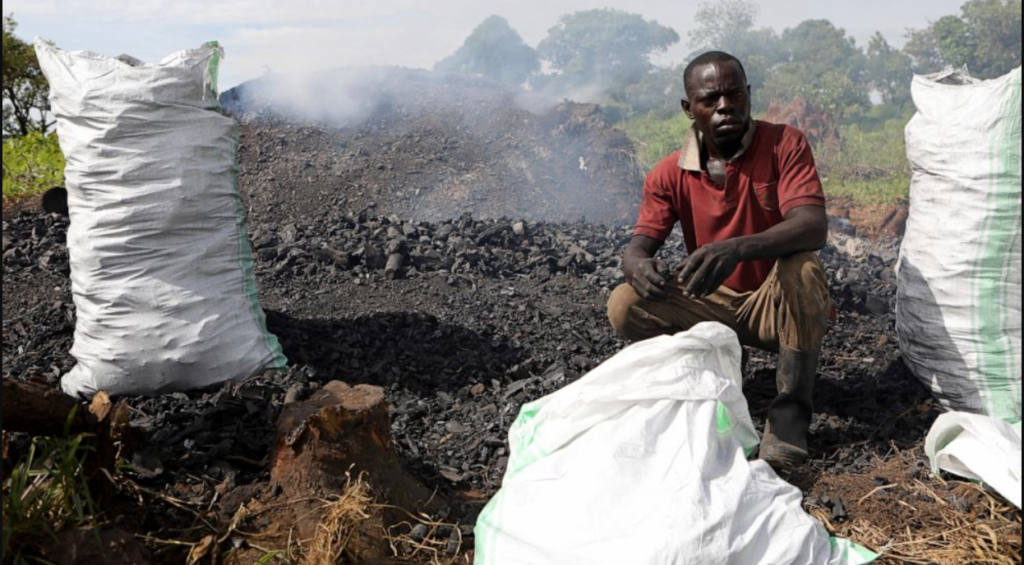
Northern Ugandan charcoal manufacturers rushed into the bush, leaving their costly log piles.
After a new legislation restricted charcoal manufacture, the employees were trying to dodge local inspectors. Getting caught meant arrest and beatings.
“We are not going to stop,” said Deo Ssenyimba, a bare-chested charcoal worker in northern Uganda for 12 years. Then what? Will we steal?”
Charcoal burning, an age-old tradition in many African communities, is now banned in northern Uganda due to people’ hatred of outsiders’ unregulated tree chopping, which they say threatens climate change. Charcoal manufacturers circumvent the restrictions to maintain supply and vigilantes take matters into their own hands, so little has changed.
Northern Uganda is green yet sparsely inhabited and underdeveloped, enticing investors for its charcoal business potential. According to a 2018 UN Food and Agriculture Organization assessment, charcoal supplies 90% of Africa’s basic energy needs.

Charcoal manufacturers risk their livelihood.
In Gulu, a former legislator led a vigilante mob that attacked a vehicle with 380 bags of charcoal before the charcoal ban. The chief justice lauded Odonga Otto, who was accused with aggravated robbery.
“I have not heard anybody who is destroying our environment being charged,” remarked northern Ugandan Chief Justice Alfonse Owiny-Dollo. Is stealing from a thief stealing?
After Owiny-Dollo’s statements, President Yoweri Museveni banned commercial charcoal manufacturing in northern Uganda, disturbing a national commerce that has long been driven by cultural sensitivities as much as empty land. Other places allow commercial charcoal manufacturing.
A 2021 climate change law allows municipal governments to restrict environmentally hazardous activities. Charcoal emits carbon dioxide, whereas trees absorb it.
A team of Associated Press journalists entered a charcoal-burning enclave in a rural region of Gulu, 335 kilometers (208 miles) from Kampala, days after Museveni’s edict.
Patiko Sub-County Chairman Patrick Komakech pursued fleeing footprints. A little area of bamboo opened to an almost barren region where trees were being chopped, juicy stumps still fresh.

Komakech was upset and crying.
One pile of timber was treated, and grey smoke emanated from it. Charcoal sacks around it. Charcoal producers slept in little tarp tents with dried leaves.
“I am completely perturbed (by) all this destruction,” Komakech said of charcoal producers who “are actually imported and put in this community, and they do this thing without the mercy of leaving any vegetation.”
He kicked falling logs, stating they were from the African Shea tree, which the Acholi people revere for its fruit and cosmetic-use oil.
The charcoal burners told Komakech that they were only making a living and meeting demand.
Uganda needs inexpensive plant-based energy, notably charcoal, due to its population growth. Charcoal is favoured in houses across this east African country of 45 million people, especially in urban poor households, for slow-cooking foods. Middle-class families use gas and charcoal stoves.
“Even those policemen coming to beat us, they are cooking with charcoal,” stated Peter Ejal. We won’t pollute. The tree sellers ordered us here.
His ragged charcoal making comrade Ssenyimba plainly stated, “When we finish this place we will go to another place.”
One charcoal producer said the State House utilized northern Ugandan charcoal. Others said they were chopping trees alongside landlords who sell charcoal-making rights by the acre to interested traders.

Landowners and investors can profit.
Charcoal costs $14 in adjacent places but climbs as it nears Kampala. Every bag Ssenyimba creates costs $3.
In Gulu, an acre of land with plenty of trees costs $150, but impoverished families’ isolated ranches with lots of greenery cost considerably less. The investors then send personnel with power saws and machetes to hack down the trees they bought.
According to Museveni and Otto, the former legislator spearheading vigilantes against charcoal manufacturers, unscrupulous members of the armed forces have been supporting charcoal transporters. District councils in the region earn income via licensing and fees.
Otto has helped detain many vehicles in recent weeks, including two parked outside a police station where a throng gathered one afternoon to steal the supplies.
He aims to send hundreds of municipal authorities letters of intent to sue for environmental violations. Otto told the AP he wants Uganda to “lose appetite” for charcoal from his region.
“We destroy the bases in the charcoal oven fields,” he stated. “We risked the business. Currently, you may go 100 kilometers and not see a single charcoal truck.”
Charcoal prices would rise due to northern Uganda’s commercial manufacturing prohibition. Otto and others worried that charcoal merchants would dodge authorities by transporting charcoal bags in tiny quantities on passenger bikes to places where they might quietly load them onto trucks.
Alfred Odoch, a local environmental activist, called charcoal production “the biggest threat” since the conclusion of a rebel rebellion two decades ago and supported vigilantes.
Odoch claimed vigilantes pressure charcoal burners and local officials to stop “mass tree cutting” in northern Uganda. Charcoal production should be limited to families selling “two or three sacks” each week, he suggested.
He supported his fellow vigilantes. “Environmental justice is for everyone.”
